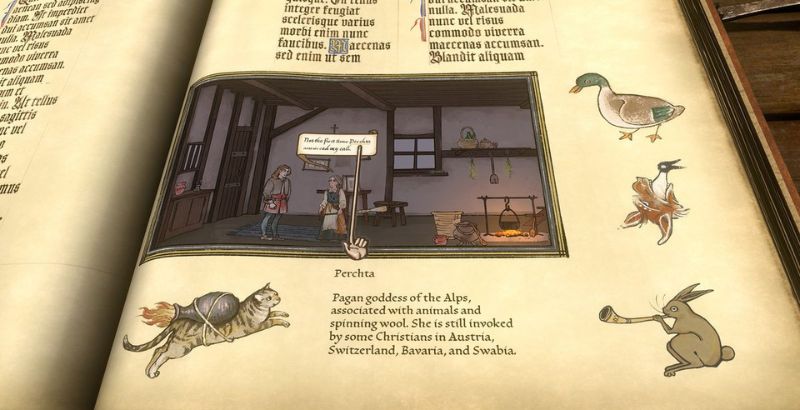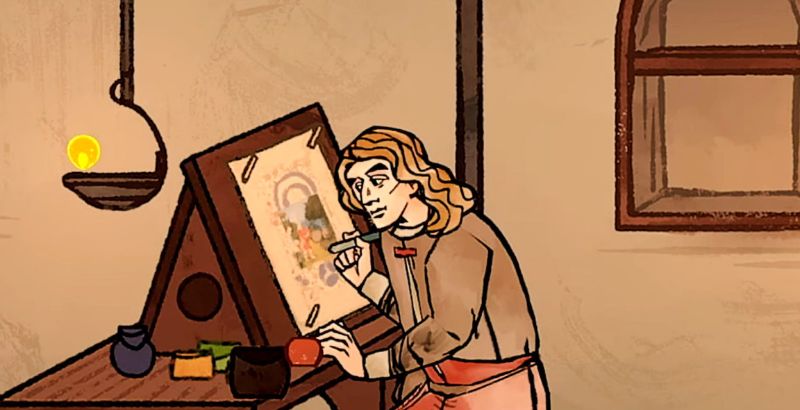Pentiment is a new mystery narrative game developed by Obsidian Entertainment and directed by Josh Sawyer, writer of games like Fallout New Vegas and Pillars of Eternity. It takes players through a story spanning 25 years in the 16th century and lets players explore the time period and solve murders.
The game is centered around a fictional town in Bavaria named Tassing and the nearby abbey of Kiersau. Players are introduced to the town through the eyes of a young artist named Andreas Maler, who works at the abbey. Early on, players also get to fill in elements of Andreas’ background, influencing his dialogue options during conversations and helping players feel even more invested in his story. Eventually, a murder is committed, and one of Andreas’ friends is accused. To clear his friend’s name, Andreas launches an investigation of the murder and plays a pivotal role in the conclusion of the investigation.
While looking into the murder, players interact with the various citizens of Kiersau to learn about them and the town’s history. These conversations are at the core of the gameplay in Pentiment and contain some of the best writing in the industry.
The writing is so successful because of how natural it feels to each character and because it invites players to participate in debates and discussions regarding the happenings of the time period. Topics like serfdom, the Protestant Reformation, and the place of art in society are all fair game. While these topics are examined through the prism of materialism, the game is far from a lecture. Instead, the conversations simply ask the player to participate.
Players are restricted to a very tight timeline when solving the game’s mysteries. Andreas gets more leads than he has time to follow up on, forcing players to make the best decision they can without all the information. This leads to tough decisions as lives are in the player’s hands. It is ultimately up to them to decide whether the evidence they have found is sufficient and to make the best call they can. There are no clear-cut answers, only possibilities.
Thanks to Pentiment’s story spanning 25 years, players can see the sprawling impacts of their decisions. As time goes on, characters start families and die, Tassing evolves, and tensions rise in turbulent times. This helps make players feel the impacts of their choices and how they spent their time throughout the game. It all coalesces perfectly to create a world that feels as alive and complicated as our own.

To help the world of Pentiment feel even more real, the developers went to great lengths to ensure that the game was incredibly accurate to history. This is done in numerous ways. Firstly, while Pentiment is set in a fictional village, its issues and tensions are very much derived from real-world problems at the time. This gives a lot of extra weight to the problems explored in Pentiment and helps it feel even more grounded.
Secondly, players can participate in various minigames throughout the game that helps showcase some of the activities people would do at the time. These minigames are far between, but they mix up the game’s pacing admirably and are interesting to see.
Finally, Pentiment also goes to great lengths to be accurate even with its text. The style of text not only changes depending on the character speaking by accounting for their personality and education but has different animations as well. Some dialogue will just be written out, while at other times, the outlines of the words are drawn first, only to be colored in later. Religious words are also always written last and in red ink, as was the custom at the time, and if you look close enough, you can even see the ink of the words soaking into the page after they are written.
The historical accuracy also extends to the game’s overall aesthetics, and it is gorgeous. The old-fashioned graphics give the game loads of personality and make it feel so much more immersive despite its pulled-back perspective and absence of voice acting.
The game also has an admirable amount of accessibility options that are worth pointing out. There are extensive options to help players with disabilities and tweaks for the in-game text to ensure that players are comfortable reading all of the dialogue for extended periods of time. With the extensive options, it is difficult to think of any player that wouldn’t be able to experience Pentiment, which is always great to see.
Pentiment also has a great feature, similar to one found in Pyre, that highlights words and character names when they appear in dialogue. Players can press the back button to get definitions and portraits associated with the terms and names. This is a great tool to help players keep track of characters and learn the necessary information about the time period as it comes up.
Pentiment is a game that will stick with you for a long time after you play it. Its unique blend of thought-provoking discussion, historical accuracy, and challenging a player’s morals all work to push players to consider everything going on in the game and weigh the pros and cons of heavy decisions that must be made with limited information. Without going into spoilers, there was one decision during the game that I spent nearly ten minutes thinking about, and I’m still not sure I made the right choice even after finishing two playthroughs. It takes a very special work of art to make an observer feel as much as Pentiment does, and the game manages to do so consistently throughout its entire runtime.
Pentiment is available November 15 on PC, Xbox One, and Xbox Series X/S and Nintendo Switch.
Pentiment
-
Rating - 10/1010/10
TL;DR
Pentiment is a game that will stick with you for a long time after you play it. Its unique blend of thought-provoking discussion, historical accuracy, and challenging a player’s morals all work to push players to consider everything going on in the game and weigh the pros and cons of heavy decisions that must be made with limited information…It takes a very special work of art to make an observer feel as much as Pentiment does, and the game manages to do so consistently throughout its entire runtime.







